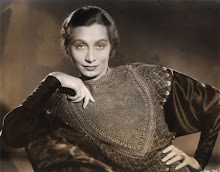It was Friday night; they usually closed slightly later to get the last minute business that was still straggling up from downtown. Instead of closing at nine, Ilsa was running an hour late. But now, her final tasks done, she looked around for the last time. Everything was in order. The transition had gone smoothly.
Ilsa looked out the large store window -- the reverse image of the letters always amused her. She threw the main switch, picked up the package she had put together for a light supper. Fish cakes, of course. She smiled and thought of those Fridays of yesterday. It was early January and the streets still had scattered mounds of that dirty snow made more unsightly by the endless stream on buses on this major avenue.
Ilsa Lund Laszlo opened the door, passed through it, turned and locked each lock carefully. She had left the neat printed sign, inside, hanging from a strong cord in the door window. Laszlo’s on Lex -- Closed.
Movietone's taking a break
13 years ago






















